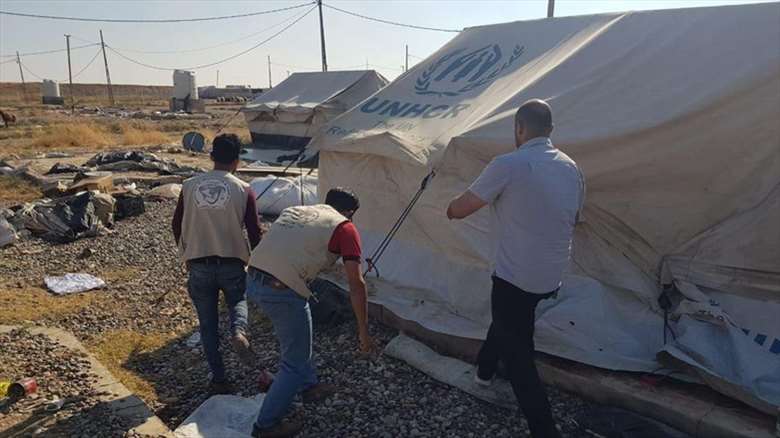Iraq says thousands of IDPs return to homes in Nineveh, plans to shutter two large camps
In the coming days, the Iraqi government would shut down two of the country's largest IDP camps, a federal official said on Monday.

ERBIL (Kurdistan 24) – The Iraqi Ministry of Migration and Displacement on Monday announced the return of another group of internally displaced persons (IDPs) to their places of origin in Nineveh province.
The returnees lived for years in the Hammam al-Alil and Jada, the first and the fifth camps in Nineveh province, the ministry said. A total of 2,220 individuals went back to their homes in Mosul and its surrounding areas, it added.
The ministry noted that the government continues to “pursue the safe and voluntary return of displaced families to their areas of residence, in preparation for closing the displacement file.”
The Minister of Migration and Displacement Evan Faiq said in a televised statement that the authorities would close the two largest camps in the country “in the next two days.” One of them is in Anbar province, housing 1,400 families, and the second one in Nineveh province, where 1,800 families reside.
More than six million people have fled to other areas inside Iraq, the Kurdistan Region, and neighboring countries since the terrorist group ISIS seized two-thirds of Iraq in 2014.
Most of the IDPs have already returned to their homes, but over one million people are still displaced, most of them in the Kurdistan Region’s camps and host communities, according to the government statistics.
On Oct. 30, the United Nations said that the Iraqi government “independently” decided to close all IDP camps by the end of 2020.
Read More: UN: Baghdad’ independently’ decided to shutter all IDP camps by end of 2020
Since early 2019, the federal government in Baghdad has facilitated the resettlement of large numbers of refugees and IDPs to their areas of origin.
Iraqi officials have repeatedly been accused of blocking some populations from their homes while forcing others into areas to which they were afraid, or otherwise unwilling, to return, as documented by Human Rights Watch.
Read More: Iraq blocks displaced families from returning home, forces others to return: HRW
Amnesty International, too, alleged that Baghdad was forcefully returning IDPs and sternly called on authorities to end the practice.
Read More: Amnesty’ extremely disturbed’ with reports of forced return of IDPs in Iraq
Thousands of refugees and IDPs continue to resist returning to their towns due to serious security concerns and a lack of infrastructure and basic government services.
Iraq’s Ministry of Migration and Displacement, Ministry of Foreign Affairs, and multiple other Iraqi governmental bodies have a longstanding policy to refuse the non-voluntary return of Iraqi nationals from abroad. This includes those in European nations and the United States, both of which have often exerted considerable diplomatic pressure in recent years for Iraq to accept them.
Editing by Khrush Najari